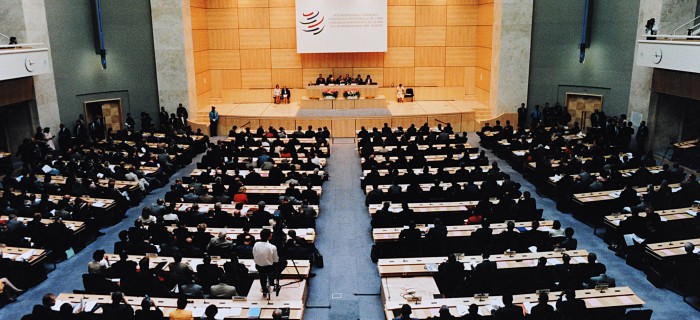The Doha Collapse: Time to get agriculture out of the WTO
August 2008, Policy Brief No. 15
The recent collapse of the Doha “development” round of WTO negotiations means that they are going into low (or no) gear until a new U.S. President and Congress swing into action sometime next year. The talks were almost certainly dead in the water from the start due to the 2008 U.S. Farm Bill that was passed earlier this year by veto-busting majorities in the House and Senate. The bill was loaded with $40 billion in subsidies for agribusinesses, many of which are not only in violation of the WTO’s nominal principles but also contravene the agricultural support restrictions that G7 trade representatives force on weaker economies. The fact that U.S. domestic law trumps WTO rulings at home suggests that anyone expecting the champions of global trade to give up their advantage will surely be disappointed. There are however good reasons to view the collapse of the DOHA round as an opportunity to press forward with some much needed reforms. These can be gleaned on the one hand from some issues that were never tabled and may yet be recast, and on the other hand from the solidarity displayed by the developing countries in the wake if the breakdown. Perhaps this solidarity, spurred by the global food crisis, can be a springboard for real change.
What Happened? China and India Blamed for the collapse
The first wave of stories about the collapse of the talks had to do with China’s and India’s unreasonable demands. The Washington Post painted a picture of these intransigent upstarts. Sadly, this was the first (and last) impression many people would get:
High-level delegations from the United States and the European Union showed fresh willingness at the World Trade Organization talks to make concessions that would have gradually curbed the subsidies and tariffs they have long employed to protect First-World farmers. But India and China dug in their heels, insisting on the right to keep protecting their farmers while accusing the United States and other rich countries of exaggerating the generosity of their concessions.
The Post’s story threw in a dismayed quote from the president of the U.S. Chamber of Commerce chastising India and China for missing an “opportunity to show leadership as key players in the global trading system.” The New York Times surmised that China and India felt secure enough in the global economy to negotiate bilateral agreements, where they could apply more pressure.
As is often the case they got part of the story right, and another part exactly backwards. The U.S. was indeed exaggerating the generosity of their concessions, but India was showing global leadership, just not the type of leadership the U.S. wanted to see. The ‘unreasonable position’ that India took to meetings with the G-7 was supported by the 40 countries in the G-33, as well as nearly 60 other developing countries. Theirs was the simple proposition that fragile economies should be allowed a special safeguard mechanism (SSM) in agriculture. Briefly, the SSM as proposed allows countries impose duties higher than the agreed ceiling level on farm imports if import volumes rise above their three-year average by an agreed percentage. The goal is to protect poor farmers against rapid commodity price declines.
Stay in the loop with Food First!
Get our independent analysis, research, and other publications you care about to your inbox for free!
Sign up today!


 Help Food First to continue growing an informed, transformative, and flourishing food movement.
Help Food First to continue growing an informed, transformative, and flourishing food movement.




